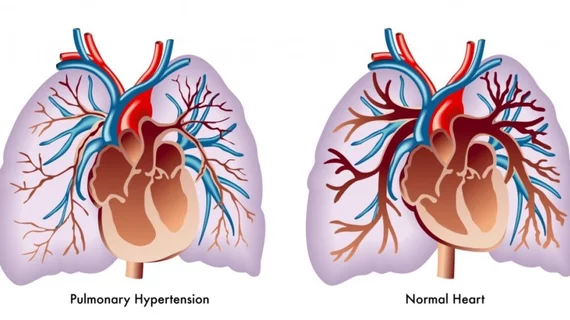Benefit of anticoagulation for PAH may hinge on disease subtype
A recent meta-analysis published in Circulation: Cardiovascular Quality and Outcomes suggests the benefit of anticoagulation for pulmonary arterial hypertension (PAH) may depend on the subtype of the condition. Mortality rates improved with anticoagulation for patients with idiopathic PAH but worsened for those with scleroderma-associated PAH.
Most evidence supporting the use of warfarin or other anticoagulants in PAH comes from small, retrospective studies, noted lead author Muhammad Shahzeb Khan, MD, and colleagues. Even so, the American College of Cardiology gives a Class 2b recommendation for anticoagulation with warfarin to an International Normalized Ratio of 1.5 to 2.5 for PAH patients across subtypes, meaning evidence and expert opinion supports the benefit of the treatment is greater than or equal to its risks.
To provide more data on this patient population, Khan et al. pooled data from 12 original studies that compared any oral anticoagulant against a placebo or no treatment. Their final analysis contained 2,512 patients—1,342 receiving anticoagulation and 1,170 controls—who were followed for a median of five years.
For the overall PAH cohort, anticoagulation was associated with a 27 percent reduction in mortality. The same magnitude of risk reduction was seen in those with idiopathic PAH but not in those with connective tissue disease-related PAH, who showed a statistically insignificant increase (16 percent) in mortality with anticoagulation.
In a sensitivity analysis where only scleroderma-associated PAH was analyzed, there was a significant 58 percent increase in mortality among those taking anticoagulants compared to controls.
“This meta-analysis shows that use of anticoagulation may improve survival in idiopathic PAH (IPAH) patients, while increasing mortality when used in scleroderma-associated-PAH patients,” the researchers wrote. “Currently, no randomized clinical trials have been published, and until randomized data are available, anticoagulant use in PAH should be tailored to PAH subtype.”
The authors noted a previous, smaller meta-analysis found a survival benefit among all PAH patients taking oral anticoagulants. But that analysis didn’t stratify the results by PAH subtype, and the publication by Khan et al. added three additional studies, including two with a relatively large sample size.
Khan and colleagues said their meta-analysis was limited by the observational nature of several of the included studies, which leaves open the possibility of confounding factors being transferred to the meta-analysis. Also, there was substantial variability in the background treatment patients were receiving both within and between studies.

